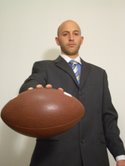LIVING IN ROGER'S WORLD
By Scott Daniels, NFL Draft Bible
In an image driven league, the NFL took major steps to clean up its act this year when Commissioner Roger Goodell announced his new Personal Conduct Policy in April. The Policy is a measure of deterrence against the appalling off the field conduct by players that has plagued the league of late. With the Policy, Goodell made it clear that detrimental conduct off the field will not be tolerated. After countless arrests and numerous off the field incidents in 2006, Goodell, who got his start as an administrative intern under then NFL Commissioner Pete Rozelle, is attempting to weather this storm by delivering harsh penalties and swift action. Just ask Pacman Jones and Chris Henry. A year long suspension for Jones and eight games for Henry sent shock waves throughout the league and Goodell's message was loud and clear: Tarnish my league and you'll suffer the consequences.
While Goodell's Policy sounds like an effective way to clean up the NFL's image problems, it raises numerous legal issues that have already spurned controversy throughout the league. I believe that a rigid conduct policy is necessary in a league that has seen its fair share of criminal activity off the field, but the legality of the policy is very suspect. Is Goodell's Policy legal? Does he have the right to suspend players before they are convicted in a court of law? The answer to both questions is Yes and players in the NFL are quickly realizing that their new Commissioner is not afraid to exercise his power.
I am not questioning the rationale behind the Policy. It's absolutely going to make players think twice before acting outside the law. But does it go too far? What happened to the notion of "Innocent until proven guilty?" What about a players' right to due process and his opportunity to defend himself in the court of law? Well, under this new conduct Policy, a player's innocence is no longer presumed.
The major issue I see with this Policy is that a player may lose his ability to be gainfully employed even before he is found guilty of anything. Under the new Policy, a player can be punished by the league before he is convicted of a crime. In fact, there is a clause entitled "Persons Charged with Criminal Activity." According to this section, if a player is simply charged with a criminal matter, he is required to undergo a clinical evaluation and possibly even counseling. During the player's evaluation and / or counseling, if that player is arrested for or charged with additional criminal activity, he has committed "conduct detrimental to the team" and can be suspended or fined at the discretion of the Commissioner.
Goodell has essentially tossed out the idea that some of these players might actually be innocent of the crimes they are charged with. A player who is arrested or charged several times certainly creates the inference that they might not be a model citizen, however, justice cannot be had without listening to all the facts. The presumption of innocence is a pillar of not only the American Legal system, but our society. To suspend or fine a player before he is convicted of a crime contradicts the longstanding idea that a man is always presumed innocent until proven otherwise.
As for the legality of the policy itself, since the NFL is a private entity, Goodell has complete autonomy to create such a policy. While Goodell did consult with Gene Upshaw, the head of the NFL Player's Association and established a six player advisory committee to discuss conduct and disciplinary measures, this Policy was not collectively bargained for, nor was it expressly agreed upon by the entire league. But it doesn't matter because the Policy didn't have to be.
Since the inception of Goodell's new Policy, 3 players have been suspended for off field incidents. The bottom line is, playing in the NFL is a privilege, not a right. Say goodbye to the days of twenty thousand dollar fines that mean nothing to the stud wide out who gets arrested, charged and convicted for driving under the influence. Say hello to Roger Goodell and an incredibly strict conduct policy that has the potential of damaging a truly innocent player's future in the NFL.
Scott Daniels is a NYC Attorney and Co-Founder of The Legal Line. Read about the legal perspective of football politics as one of New York’s premier lawyers provides you with insight and analysis that even Mike Vick would pay for.
Email: scott@nfldraftbible.com
Tuesday, July 31, 2007
Monday, July 30, 2007
WELCOME TO THE LEGAL LINE!
Scott Daniels and Rick Serritella have partnered up to deliver "The Legal Line", a unique perspective from NYC attorney Scott Daniels as he provides legal insight into the world of Law and Football.
Feel free to contact us and let us know how we are doing or any suggestions you may have.
-RIC
ric@nfldraftbible.com
Feel free to contact us and let us know how we are doing or any suggestions you may have.
-RIC
ric@nfldraftbible.com
Subscribe to:
Posts (Atom)
